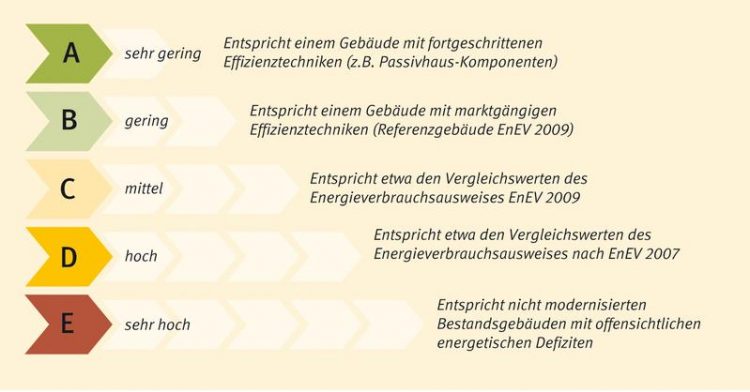“TEK-Tool” software supports energy consultants

The results of the building analysis can be categorised in one of five classes. © IWU
Until now, analysing the weak spots of the architecture and building services equipment of existing non-residential buildings has been a very labour-intensive process.
The BINE Projektinfo brochure “Energy performance analysis of complex existing buildings” (16/2013) presents the new TEK-Tool developed for just this purpose. It lightens the required workload significantly.
The program helps energy consultants understand actual consumption, evaluate partial energy consumptions, identify weak spots and calculate potential savings.
A conventional mathematical building analysis following DIN V 18599 for existing buildings requires detailed data. With TEK-Tool, the calculation procedure has been simplified and an analysis will take about three days of work. The program runs its calculations using partial energy characteristic values.
This method breaks down the energy requirements of a building according to the various systems, such as heating and lighting as well as building zones. The partial energy characteristic values thus determined are compared with reference values of the same systems and with buildings with a similar use.
The method is similar to the reference building method carried out for the energy requirement certificate. TEK-Tool also suggests modernisation measures.
Together with academic and professional experts, scientists at Institut für Wohnen und Umwelt GmbH (IWU) Darmstadt developed the TEK-Tool program. The freeware program is available for download at www.iwu.de.
The BINE-projectinfobrochure, which can be obtained free of charge from the BINE Information Service at FIZ Karlsruhe, is available online at www.bine.info or by calling +49 (0)228 92379-0.
Press contact
Uwe Milles
presse(at)bine.info
About BINE Information Service
Energy research for practical applications
The BINE Information Service reports on energy research topics, such as new materials, systems and components, as well as innovative concepts and methods. The knowledge gained is incorporated into the implementation of new technologies in practice, because first-rate information provides a basis for pioneering decisions, whether in the planning of energy-optimised buildings, increasing the efficiency of industrial processes, or integrating renewable energy sources into existing systems.
About FIZ Karlsruhe
FIZ Karlsruhe – Leibniz Institute for Information Infrastructure is a not-for-profit organization with the public mission to make sci-tech information from all over the world publicly available and to provide related services in order to support the national and international transfer of knowledge and the promotion of innovation.
Our business areas:
• STN International – the world’s leading online service for research and patent information in science and technology
• KnowEsis – innovative eScience solutions to support the process of research in all its stages, and throughout all scientific disciplines
• Databases and Information Services – Databases and science portals in mathematics, computer science, crystallography, chemistry, and energy technology
FIZ Karlsruhe is a member of the Leibniz Association (WGL) which consists of 87 German research and infrastructure institutions.
http://www.bine.info/en/press/press-releases/press/pressemitteilung/software-tek… – Download cover, press release and info-pdf
http://www.bine.info/en – BINE Informationsdienst english
Media Contact
All latest news from the category: Architecture and Construction
Newest articles

Dark energy ‘doesn’t exist’ so can’t be pushing ‘lumpy’ Universe apart
One of the biggest mysteries in science – dark energy – doesn’t actually exist, according to researchers looking to solve the riddle of how the Universe is expanding. For the…

Warming exacerbates oxygen depletion in the Baltic Sea
Rising water temperatures undermine nutrient reduction efforts. Eutrophication and rising water temperatures are taking an increasing toll on the Baltic Sea, leading to dangerous oxygen depletion in deeper water layers…

Time-resolved polarimetric electron microscopy reveals spin meron pair
New technique reveals complex spin structures at femtosecond timescales. Plasmons are collective oscillations of electrons in a solid and are important for a wide range of applications, such as sensing,…



